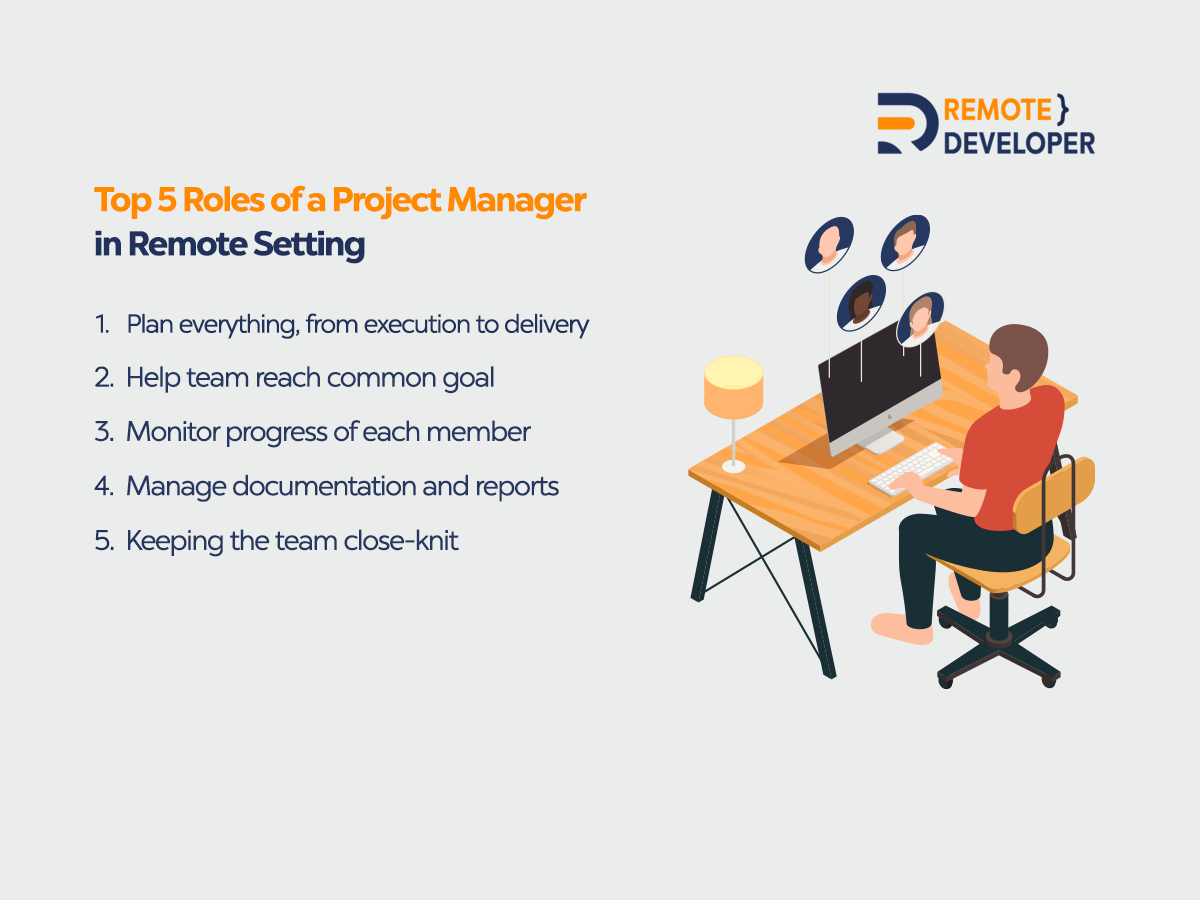We often juggle tasks, clients, and projects in today’s competitive and fast-paced corporate world. Usually, employees have no idea how to prioritize their energy and focus, which eventually results in burnout and resignation. This is why project manager roles are essential in a company.
Generally, a project manager helps a team reach a common goal or finish a project flawlessly. They take care of everything from resources, and risks, to execution. Moreover, they constantly need to take care of the team and find a balance between work and life.
However, project manager roles expand with more companies adapting to remote setups. So, if you are a project manager or aspiring to be one, here is an article that will help you understand the crucial parts of project managers in a remote setup.
What is a Project Manager?
A project manager is in charge of a project from start to finish. They are usually employed by companies needing help with managing projects or freelancers offering their services to companies that require them.
Moreover, they are in charge of the entire process, from planning to execution and everything in between. Project managers are responsible for the project’s timeline, budget, and quality.
This role requires leadership skills, coordination, and analytical capability in IT and development. The project manager ensures that the project is completed on time and within budget. A project manager may coordinate work among developers, designers, testers, and other stakeholders.
Likewise, the responsibilities of a project manager include:
- Defining requirements
- Planning the work schedule
- Ensuring that deadlines are met
- Tracking progress
- Identifying risks and potential problems
Top 5 Roles of a Project Manager in Remote Setting
A project manager’s role is ten times harder in a remote setting. A remote team faces unique challenges that can cause a team to be less effective than a team in an office. They are often unsynchronous and sometimes communicate ineffectively.
In this case, it’s the remote project manager’s responsibility to ensure that all team members communicate correctly. They need to ensure no conflict between the team and oversight. The project manager needs to see that all tasks are monitored and accomplished.
Likewise, here are the five most crucial roles of a remote project manager:

1. Plan everything, from execution to delivery
The job of a project manager is not easy. A remote project manager manages a project’s planning, execution, and closure. They lead the team to reach a common goal. Moreover, they must keep track of deadlines and budgets and ensure everything goes according to plan.
Project managers are required for every successful project for it to run smoothly. Here are some must-have skills of a remote project manager:
- Creating an action plan
- Time management to ensure that all deadlines are met
- Organization skills to delegate tasks
- Ability to multi-task
2. Help the team reach a common goal
As mentioned, the remote project manager manages the project and its team members from start to finish. They lead the team to success. Likewise, one critical role of a remote project manager is that they help their team reach a common goal.
In a remote setting, miscommunication is a common issue. Some team members may not effectively relay information to one another, resulting in the whole team being sidetracked and forgetting the project’s primary goal.
In a time like this, a project manager should be able to realign the whole team and reach for a common goal. They must ensure that the project is on schedule, that deadlines are met, and that all necessary resources are available.
3. Monitor the progress of each member
We all know it’s easy to be sidetracked with everything in a remote setting. As more tasks pile up, we are expected to prioritize what needs to be done first. And often, remote workers do not finish essential tasks within the deadline, which delays the whole project.
Since the remote project manager oversees the whole project, they are also responsible for ensuring that all tasks are finished within the deadline. Most project managers’ time revolves around making sure that all functions or parts of the projects are done.
Project managers are responsible for the coordination of the development process. They must ensure that each team member completes their tasks on time and meets deadlines. They also need to keep track of any issues that may arise in the process.
Likewise, most project managers use a project management tool such as Gantt Charts, Scorecards, or Kanban Software to fully tracked the team’s progress.
4. Manage documentation and reports
In every project, documentation and report are essential. It helps the team to be on the same page during and in any continuation of a project. Moreover, it helps new team members speed up learning the different aspects of the project, understand what’s expected of them, and how they can contribute.
Likewise, a remote project manager should be able to manage and organize documentation and reports, even without being in the office.
5. Keeping the team close-knit
In every remote team, close-knit is essential. It helps the team have a harmonious relationship, high morale, and support. Close relationships also foster trust within the team and ensure a seamless work environment.
Likewise, a remote project manager is in charge of keeping the whole remote team close-knit. They need to stay in touch with their team members and ensure they are on the same page, even if they are not working together in the exact location.
Likewise, a remote project manager should do the following:
- Guarantee that all members get regular feedback
- Understands everyone’s role, responsibilities, and capabilities
- Ensure that everyone communicates well.
- Warrant that all team has enough tools and resources.
Conclusion
Behind every successful team is a great leader. They keep the whole crew on the same page and ensure harmonious relationships while being able to handle everything. Sustainable growth in most companies relies on them.
So, pat yourself on the back if you are a project manager or a leader. And if you are aspiring to be one, learn more about how you can be an expert in your field. After all, anyone can be a project manager, but not all can be a leader.

